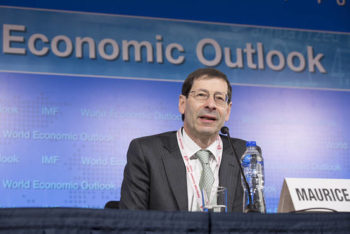
The International Monetary Fund (IMF) says rise in oil prices, continued growth in agriculture, and big government spending will drive Nigeria’s economic growth to 0.8 percent in 2017.
IMF chief economist, Maurice Obstfeld, who unveiled the fund’s World Economic Outlook in Washington on Wednesday, said global growth will continue with the help of advanced economies and emerging, low income countries.
“We project the world economy to grow at a pace of 3.5 percent in 2017, up from 3.1 percent last year, and 3.6 percent in 2018. Acceleration will be broad based across advanced, emerging, and low income economies, building on gains we have seen in both manufacturing and trade,” Obstfeld said.
He added that commodity prices “have firmed since early 2016, but at low levels, and many commodity exporters remain challenged – notably in the Middle East, Africa, and Latin America”.
“At the same time, a combination of adverse weather conditions and civil unrest threaten several low-income countries with mass starvation. In Sub-Saharan Africa, income growth could fall slightly short of population growth, but not by nearly as much as last year.”
The outlook also explained how Nigeria will return to growth after an economic decline of 1.5 percent in 2016.
“In sub-Saharan Africa, a modest recovery is foreseen in 2017. Growth is projected to rise to 2.6 percent in 2017 and 3.5 percent in 2018, largely driven by specific factors in the largest economies, which faced challenging macroeconomic conditions in 2016,” the outlook read.
“After contracting by 1.5 percent in 2016 because of disruptions in the oil sector coupled with foreign exchange, power, and fuel shortages, output in Nigeria is projected to grow by 0.8 percent in 2017 as a result of a recovery in oil production, continued growth in agriculture, and higher public investment.”
The IMF also said “inflation in 2017 is expected to remain at double-digit levels in a few large economies in sub-Saharan Africa (for example, Nigeria, Angola, Ghana), reflecting, among other factors, the pass through of large depreciation”.
Despite Brexit shocks, the UK is projected to grow at two percent — the fastest economic growth for the advanced economies in the European Union.
The US economy is projected to grow at 2.3 percent in President Donald Trump’s first year in office.
Meanwhile after a few quarters of negative growth that saw the death of businesses, the Nigerian economy is out of recession, but “conditions remain difficult for businesses,” a group known as World Economics said on Tuesday.
World Economics is a London-based organisation dedicated to producing financial analysis, insight and data relating to questions of key importance to the world economy.
“April Sales Managers’ Index (SMI) data suggests that the Nigerian economy is continuing to grow out of the recession which saw 10 months of consecutive contraction in 2016,” it said in a release published on its website.
“The Market Growth Index grew to 58.5 in April as the monthly Sales Growth Index ticked up to 56.7, its highest value since 2015 and representative of rapid growth. Price inflation for April, which is tracked by the Prices Charged Index, remained high at 58.7 – indicative of high levels of inflation – however, a slowing trend has developed for the past 9 months.
Nigeria’s economy receded at the end of Q2 in 2016 after falling oil prices ate deep into the country’s earnings and caused the naira to weaken thereby causing inflation to spiral upward. Spates of attacks on oil installations in the Niger Delta by militants, who were protesting for better deals from the government, almost crippled oil production.
But the government’s recent engagements in the oil-rich region, spearheaded by Vice President Yemi Osinbajo, has seen attacks on oil facilities petered out, at least, for now.
Last Thursday, National Bureau of Statistics (NBS) said the inflation rate dropped by 0.52 percent in March to close at 17.26 percent, the second decline recorded in two months.
“This is the second consecutive month of a decline in the headline CPI on a year-on-year basis,” NBS said in its report.
“It represents the effects of stabilising prices in already high food and non-food prices as well as favourable base effects over 2016 prices.”
But World Economics noted that there are still issues the economy handlers need to fix before it can be out of the woods.
“Panellists have explained that although conditions remain difficult for businesses, they are adapting to the challenges and the recent changes to the Naira’s FX rate are aiding sales transactions.”
Overall, conditions in Nigeria have improved further over the past month and managers are expressing renewed optimism that the economy will continue to grow and regain strength after the recession.